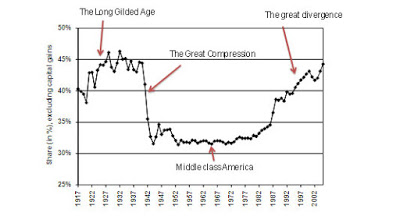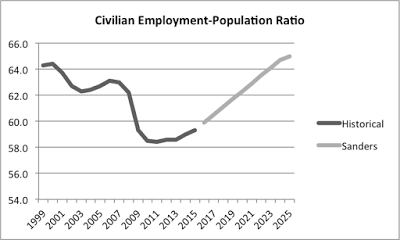So Krugman continues to argue that Friedman's calculations are implausible. Well sure. But that's the point to some extent as Galbraith discussed here. The Plan involves huge (read yuge; wink, wink, nudge, nudge) spending, and it should have almost by definition implausible results looking from the perspective of recent history. Imagine the implausible effect that Social Security had on old age poverty. Or the incredible reduction in inequality that the New Deal policies had.If you were in the 1930s, the historical record would suggest that an improvement in income distribution based on higher taxes on the wealthy and cheap college access to the masses would be implausible, and yet by the 1950s things had changed (see graph below). The historical record would say this was not possible. The guy that used the graph above said: "The middle-class society I grew up in didn’t evolve gradually or automatically. It was created, in a remarkably short period of time, by FDR and the New Deal. As the chart shows, income inequality declined drastically from the late 1930s to the mid 1940s, with the rich losing ground while working Americans saw unprecedented gains." Unprecedented, as in never done before, or implausible. Who said that? Bernie Sanders? Gerald Friedman? No, it was Paul Krugman of course.
Topics:
Matias Vernengo considers the following as important: bernie sanders, FDR, Galbraith, Gerald Friedman, Krugman
This could be interesting, too:
Matias Vernengo writes Paul Davidson (1930-2024) and Post Keynesian Economics
Matias Vernengo writes More on the possibility and risks of a recession
Joel Eissenberg writes Bernie is wrong on Social Security
Matias Vernengo writes The Gift of Sanctions
If you were in the 1930s, the historical record would suggest that an improvement in income distribution based on higher taxes on the wealthy and cheap college access to the masses would be implausible, and yet by the 1950s things had changed (see graph below). The historical record would say this was not possible.
The guy that used the graph above said: "The middle-class society I grew up in didn’t evolve gradually or automatically. It was created, in a remarkably short period of time, by FDR and the New Deal. As the chart shows, income inequality declined drastically from the late 1930s to the mid 1940s, with the rich losing ground while working Americans saw unprecedented gains." Unprecedented, as in never done before, or implausible. Who said that? Bernie Sanders? Gerald Friedman? No, it was Paul Krugman of course.
What Friedman calculates is what would be the effect of Sanders transformative policies in the real world using fairly conventional assumptions. More spending should lead to higher output, and employment. For example, Krugman has correctly complained all through the recovery what little impact the fiscal package had on the employment-population ratio. A huge increase in spending would basically look like the figure below (not from Friedman's data; but same result).
PS: That there is nothing implausible about health care for all is shown by the number of developed countries that have something like that, with government spending not much higher than the US. A reasonable increase in government spending would be of about 15% rather than 40% to achieve that.


